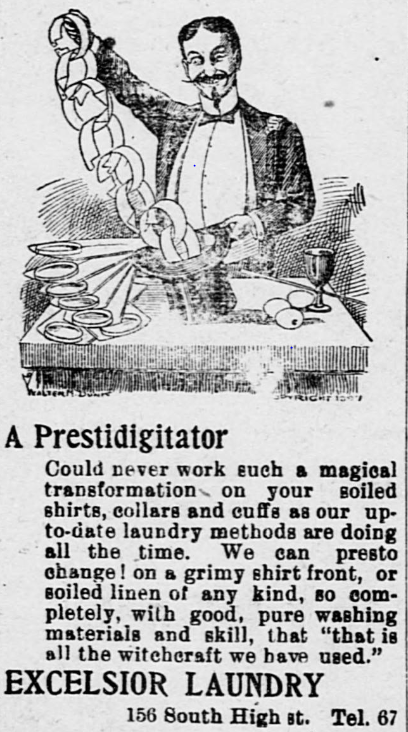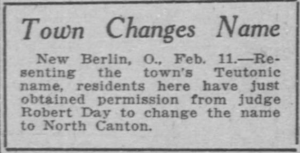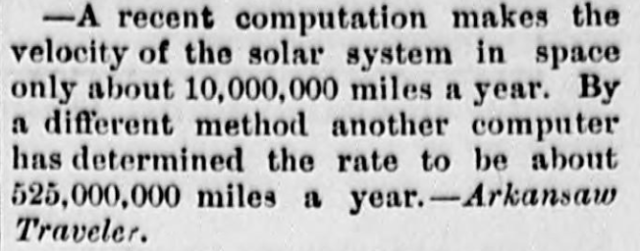
What is a prestidigitator you ask? An illusionist or magician! When is that last time you can think of someone using the word prestidigitator in normal conversation? No one calls David Copperfield a prestidigitator, and I dont blame them. Calling him a magician is much easier. Its strange how words can change meaning over time and how some words stop being used entirely. Believe it or not, vocabulary can be a major road block when doing research in historical newspapers and other historical documents because it can be so different. We actually have a term that we use to describe these vocabulary differences: historic vocabulary. We use this phrase to describe words and phrases that were used by the people living during those times. Our vocabulary is like a living organism that grows, changes, and dies. Some words that we use today were never heard of 100 or even 50 years ago and vice versa. The change in vocabulary can be caused by several factors. Much like todays technology, a newer, better, version of a word could be created thereby rendering the old word obsolete, such as the word betwixt (between).

In 1918, New Berlin, Ohio, became North Canton, Ohio, due to anti-German sentiment (El Paso Herald, February 11, 1918, Image 1, col. 2).
Geographical locations, like city and country names, are also example of how vocabulary can change and make it difficult for researchers to find a particular location. Try locating the town of New Berlin, Ohio, on a map. You will be looking for a while because that town no longer exists with that name. It is currently called North Canton and is located in Stark County. The village of New Berlin was founded in 1831 and was inhabited by mostly Germans immigrants. With the outbreak of World War I in 1914, it became very unpopular to be associated with anything German (sauerkraut was even re-named liberty cabbage in several restaurants). In 1918, the citizens of New Berlin decided to re-name the village North Canton, abandoning the original name. So if you are looking for information about North Canton in the newspapers prior in 1918, you actually need to look for New Berlin. A word can also change what it means based on new inventions. Take the word computer for example. We use it in todays language to describe the everyday machines that we use today for our Internet browsing needs, work, and just about anything else you can think of. Our definition of what a computer is did not come into existence until the 1940s. Prior to that, a computer was simply referring to a person who performed calculations or one who computes.

An example of how the word “computer” was used in the 19th century. These calculations were made by a person, not a machine! (Logan Ohio Democrat, July 23, 1887, Image 3, col. 7)
If you would like to learn more about historical vocabulary or see how it can affect your search results, click here to view one of the Ohio History Connection’s Chronicling America Search Strategy Videos available through YouTube! This short video will show you to use historical vocabulary on Chronicling America, the Library of Congress’s free digital newspaper database. There are over 250,000 pages of Ohio’s historic newspapers available on the website, with more to come. Also be sure to visit Ohio Memory to view over 150,000 pages from historic newspapers like the Ohio State Journal and Ohio Statesman.
What sort of obsolete words can you discover in the pages of old? The Chronicling America Search Strategy Videos was developed by the Ohio History Connection with support from the National Endowment for the Humanities and the Library of Congress as part of the National Digital Newspaper Program in Ohio. Please visit the Ohio Digital Newspaper Portal for more information. Chronicling America is brought to you by the National Digital Newspaper Program, a partnership between the National Endowment for the Humanities, Library of Congress and state projects to provide enhanced access to United States newspapers published between 1836 and 1922. National Endowment for the Humanities awards support state projects to select and digitize historically significant titles that are aggregated and permanently maintained by the Library of Congress at Chronicling America. As part of the project, the Ohio History Connection contributed over 200,000 newspaper pages to the project between July 2008 and August 2012 and will contribute an additional 100,000 pages by the end of August 2014. For more information about this project and resources for searching Chronicling America, please visit the National Digital Newspaper Program in Ohio Project Wiki or Ohio Digital Newspaper Program Website.